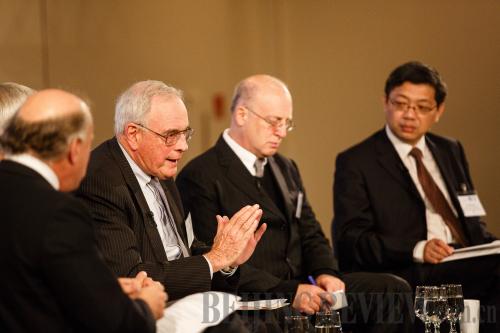|
 |
|
Panelists discuss the topic "Chasing the Dream: New Era of US-China Relations" on November 8 (MATT GILLIS) |
If the American Dream pertains to owning a home with a white picket fence, a car in the garage, flat-screen television, two kids and a dog, then what does the Chinese Dream entail? Is it really so different? Does national identity even matter anymore? Or, do we have a new class of consumers--global citizens that are powered and connected through technology to purchase whatever goods they want, wherever they are.
Financial aspirations was the topic of the day for investment bankers, diplomats, trade specialists and dozens of Chinese CEOs who gathered in New York City on November 8 for the 10th China Institute Executive Summit, titled The Chinese Dream & the American Dream: Common Perspectives, Consumer Expectations & Economic Outlook.
China and the United States are at the start of a "new wave" of business relations, challenges and opportunities facing "two of the world's largest economies," said Greg Marchi, chief representative of summit co-organizers Cheung Kong Graduate School of Business (CKGSB).
"Despite what some naysayers predict about the rise of China as a global power, in that it poses an economic threat to the United States, the fact remains that the United States is a major beneficiary of China's growth," Marchi noted, adding that China represents a $250-billion market for U.S. companies.
To take advantage of opportunities, American investors and companies need to view the market with a "Chinese lens" and understand the Chinese Dream, Marchi explained. As the summit unfolded, it became clear that the Chinese Dream and the American Dream are not so different, and that business leaders, consumers, workers and investors in the East and West both want mutual success, financial growth and safety. With the development of the Internet and social media, a generation of global citizens has risen, packed with consumers that have more in common with their economic class rather than national identities.
Plenty of challenges remain for investors, said William A. Owens, former Admiral of the U.S. Navy and current Chairman of AEA Investors Asia and Vice Chairman of NYSE Asia.
"Why is it so hard for Chinese companies to enter the United States?" Owens asked. "If you go to China today you see all kinds of American brands."
Trade barriers and government restrictions abound, Owens explained, though "Chinese business, Chinese money and Chinese friends" is essential. Such trade creates jobs, changes economies for the better and promotes bilateral ties. We need "big ideas" to change the world, he said, like a free trade zone agreement or merging stock exchanges.
A new era
The relationship between the United States and China has changed dramatically over the past 50 years into the most important and influential country-to-country partnership in the world, said F. Warren McFarlan, Baker Foundation Professor at Harvard Business School. However, infrastructure development in China and export-driven economic development since the late 1970s are just the first steps in growth, with different challenges to dominate the next twenty years.
"We find that what has gotten us to the party, is not going to keep us at the party. It is the software, the processes, the service economy, the building of habits of savings and so forth so that people can have money to spend in the consumer economy. It is a very different set of issues that we look at for the next 20 years," McFarlan said.
Huge gaps in economic inequality remain in China, and the massive migration of rural residents into cities presents many challenges. Politics, too, can slow down bilateral development, said AEA Investors' Owens.
"There's a lot of great trade between our countries, a lot of great stories," he said. "But on the national security side, besides some nice words, it's not going very well."
Military and political leaders on both sides continue to make comments about potential threats, and the use of terms like "containment" and "rebalancing" inflame tensions.
| 